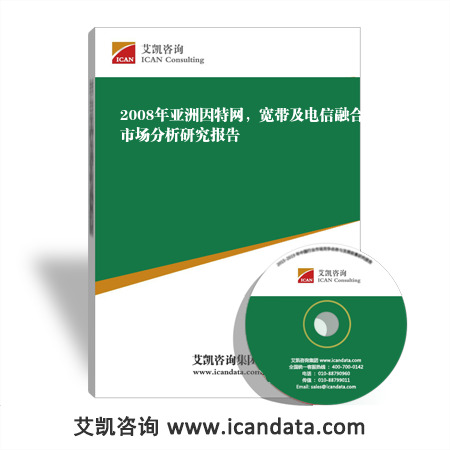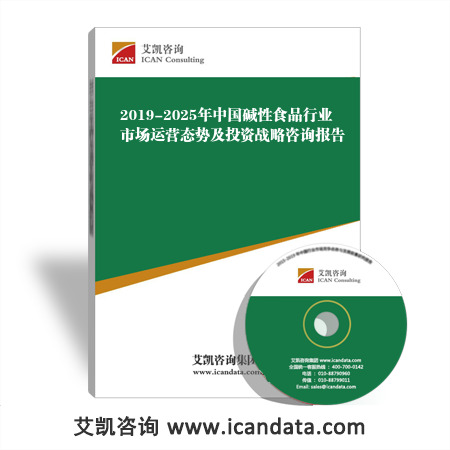数据来源与研究方法:
- 对行业内相关的专家、厂商、渠道商、业务(销售)人员及客户进行访谈,获取最新的一手市场资料;
- 艾凯咨询集团对长期监测采集的数据资料;
- 行业协会、国家统计局、海关总署、国家发改委、工商总局等政府部门和官方机构的数据与资料;
- 行业公开信息;
- 行业企业及上、下游企业的季报、年报和其它公开信息;
- 各类中英文期刊数据库、图书馆、科研院所、高等院校的文献资料;
- 行业资深专家公开发表的观点;
- 对行业的重要数据指标进行连续性对比,反映行业发展趋势;
- 通过专家咨询、小组讨论、桌面研究等方法对核心数据和观点进行反复论证。
报告简介:

摘要
This report provides 262 tables of mobile communications statistics covering 34 countries in Asia. Data for North Korea has not been included due to its paucity and unreliability.
After a period in which Asia’s mobile industry has been one of the largest and fastest-growing markets in the world, in relative terms a slowdown has occurred, especially in many of the leading national markets in the region. By September 2007, the region had amassed 1.25 billion mobile subscribers. After a period where annual subscriber growth rates have been well in excess of 50%, the rate has slowed to between 20% and 30% and was running at around 26% coming into 2008. At the same time, overall regional penetration had reached 34%, suggesting that there was still a lot more room for growth in markets throughout the region. By September 2007, Asia was home to just over 40% of the world’s 3.3 billion mobile subscribers.
There have also been a number of newcomers to the surging mobile growth pattern in Asia, notably Pakistan and Bangladesh, with markets expanding by 103% and 104% respectively in 2006. Then, there were the ‘surprise packets’, the Central Asian markets, which had a group of stand-out performers coming into 2007. While obviously coming off low subscriber bases, growth rates in this sub-region were being headed up by Turkmenistan (147%) and Uzbekistan (137%).
Asia has not only been dynamic in terms of growth; it has also been a leader in innovation with such products as NTT DoCoMo’s i-mode in Japan and the widespread application of SMS. It also offered a useful test bed in the lead up to the introduction and development of 3G services in their various forms. The innovation continued with DoCoMo launching its mobile credit card service in early 2006. By 2007, Asia was also looking enthusiastically at such developments as mobile TV.
Each country’s mobile telephone environment is characterised in its own unique way. However, across Asia, certain consistent patterns have emerged:
· opening up of local markets with the awarding of licences to new mobile operators;
· incumbent telecom operators achieving high growth as they worked to win larger market share before new operators built their networks and launched their services;
· as the new operators started expanding, highly competitive markets resulted, with corresponding decreases in tariffs and increase in value added services;
· falling ARPU for basic mobile services;
· increasing ARPU for value-added mobile services.
Growth has been spurred by industry deregulation, liberalised foreign ownership laws and the ability to build networks rapidly and economically. A significant fall in the cost of handsets has also contributed to strong growth. The launch of new entrants and fierce competition in China, Singapore, Hong Kong, Malaysia and Thailand has resulted in many benefits flowing to customers, including better service and lower prices.
Data in this report is the latest available at the time of preparation and may not be for the current year.
目录及图表
- 1.1 Internet
- 1.1.1 Subscribers
- 1.1.2 Internet penetration
- 1.1.1 Subscribers
- 1.2 Broadband
- 1.2.1 Subscribers
- 1.2.2 Broadband technologies
- 1.2.1 Subscribers
- 2.1 Country overview
- 2.2 Internet and broadband
- 3.1 Country overview
- 3.2 Internet
- 4.1 Country overview
- 4.2 Internet and broadband
- 5.1 Country overview
- 5.2 Internet and broadband
- 5.3 Convergence
- 6.1 Country overview
- 6.2 Internet
- 7.1 Country overview
- 7.2 Internet and broadband
- 8.1 Country overview
- 8.2 Internet
- 9.1 Country overview
- 9.2 Internet and broadband
- 9.2.1 Online content
- 9.2.2 Operator statistics
- 9.2.1 Online content
- 9.3 Convergence
- 10.1 Country overview
- 10.2 Internet and broadband
- 11.1 Country overview
- 11.2 Internet and broadband
- 11.2.1 Operator statistics
- 11.2.1 Operator statistics
- 11.3 Convergence
- 11.3.1 Operator statistics
- 11.3.1 Operator statistics
- 12.1 Country overview
- 12.2 Internet and broadband
- 12.3 Convergence
- 13.1 Country overview
- 13.2 Internet and broadband
- 13.3 Convergence
- 14.1 Country overview
- 14.2 Internet and broadband
- 14.2.1 Operator statistics
- 14.2.1 Operator statistics
- 14.3 Convergence
- 14.3.1 Operator statistics
- 14.3.1 Operator statistics
- 15.1 Country overview
- 15.2 Internet and broadband
- 16.1 Country overview
- 16.2 Internet and broadband
- 17.1 Country overview
- 17.2 Internet and broadband
- 18.1 Country overview
- 18.2 Internet and broadband
- 18.3 Convergence
- 19.1 Country overview
- 19.2 Internet and broadband
- 19.3 Operator statistics
- 19.4 Convergence
- 20.1 Country overview
- 20.2 Internet and broadband
- 21.1 Country overview
- 21.2 Internet
- 22.1 Country overview
- 22.2 Internet and broadband
- 23.1 Country overview
- 23.2 Internet
- 24.1 Country overview
- 24.2 Internet and broadband
- 24.3 Convergence
- 25.1 Country overview
- 25.2 Internet and broadband
- 25.2.1 Operator statistics
- 25.2.1 Operator statistics
- 25.3 Convergence
- 26.1 Country overview
- 26.2 Internet and broadband
- 26.3 Operator statistics
- 26.4 Convergence
- 27.1 Country overview
- 27.2 Internet and broadband
- 27.3 Operator statistics
- 27.4 Internet economy
- 28.1 Country overview
- 28.2 Internet and broadband
- 29.1 Country overview
- 29.2 Internet and broadband
- 29.2.1 Operator Chunghua statistics
- 29.2.1 Operator Chunghua statistics
- 29.3 Convergence
- 30.1 Country overview
- 30.2 Internet
- 31.1 Country overview
- 31.2 Internet and broadband
- 31.3 Convergence
- 31.4 Operator statistics
- 32.1 Country overview
- 32.2 Internet
- 33.1 Country overview
- 33.2 Internet
- 34.1 Country overview
- 34.2 Internet and broadband
- 35.1 Country overview
- 35.2 Internet
亚洲因特网宽带电信融合
















